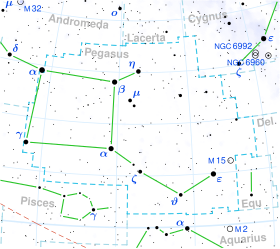31 Pegasi
 From Wikipedia the free encyclopedia
From Wikipedia the free encyclopedia
| Observation data Epoch J2000 Equinox J2000 | |
|---|---|
| Constellation | Pegasus |
| Right ascension | 22h 21m 31.07511s[1] |
| Declination | 12° 12′ 18.6628″[1] |
| Apparent magnitude (V) | 4.99[2] |
| Characteristics | |
| Spectral type | B2IV-Ve[3] |
| U−B color index | -0.81[2] |
| B−V color index | -0.10[2] |
| Variable type | γ Cas |
| Astrometry | |
| Radial velocity (Rv) | −5.30[4] km/s |
| Proper motion (μ) | RA: +6.32[1] mas/yr Dec.: +4.80[1] mas/yr |
| Parallax (π) | 2.01 ± 0.28 mas[1] |
| Distance | approx. 1,600 ly (approx. 500 pc) |
| Absolute magnitude (MV) | −3.61[5] |
| Details[6] | |
| Mass | 12.5±0.7 M☉ |
| Luminosity (bolometric) | 27,925+4,360 −3,770 L☉ |
| Surface gravity (log g) | 3.71±0.15 cgs |
| Temperature | 23,890±740 K |
| Rotational velocity (v sin i) | 98±8 km/s |
| Age | 15.4±1.3[7] Myr |
| Other designations | |
| Database references | |
| SIMBAD | data |
31 Pegasi is a single[9] star in the northern constellation of Pegasus. It is visible to the naked eye as a dim, blue-white hued point of light with a baseline apparent visual magnitude of 4.99.[2] It is located approximately 1,600 light years away from the Sun based on parallax,[1] but is drifting closer with a radial velocity of −5.3 km/s.[4]

This is a massive Be star with a stellar classification of B2IV-V.[11] It is a γ Cas variable; a type of shell star with a circumstellar disc of gas surrounding the star at the equator, and ranges from 5.05 up to 4.85 in visual magnitude.[12] It is spinning with a projected rotational velocity of 98 km/s, with the pole being inclined by an estimated angle of 26°±9° to the line of sight from the Earth.[6] The star is 15.4[7] million years old with 12.5[6] times the mass of the Sun. It is radiating around 28,000 times the luminosity of the Sun from its photosphere at an effective temperature of 23,890 K.[6]
References
[edit]- ^ a b c d e f Van Leeuwen, F. (2007). "Validation of the new Hipparcos reduction". Astronomy and Astrophysics. 474 (2): 653–664. arXiv:0708.1752. Bibcode:2007A&A...474..653V. doi:10.1051/0004-6361:20078357. S2CID 18759600. Vizier catalog entry
- ^ a b c d Ducati, J. R. (2002). "VizieR Online Data Catalog: Catalogue of Stellar Photometry in Johnson's 11-color system". CDS/ADC Collection of Electronic Catalogues. 2237. Bibcode:2002yCat.2237....0D.
- ^ Hoffleit, D.; Warren, W. H. (1995). "VizieR Online Data Catalog: Bright Star Catalogue". VizieR On-line Data Catalog: V/50. Originally Published in: 1964BS....C......0H. 5050 (5th Revised ed.). Bibcode:1995yCat.5050....0H.
- ^ a b Gontcharov, G. A. (2006). "Pulkovo Compilation of Radial Velocities for 35 495 Hipparcos stars in a common system". Astronomy Letters. 32 (11): 759–771. arXiv:1606.08053. Bibcode:2006AstL...32..759G. doi:10.1134/S1063773706110065. S2CID 119231169.
- ^ Anderson, E.; Francis, Ch. (2012). "XHIP: An extended hipparcos compilation". Astronomy Letters. 38 (5): 331. arXiv:1108.4971. Bibcode:2012AstL...38..331A. doi:10.1134/S1063773712050015. S2CID 119257644. Vizier catalog entry
- ^ a b c d Zorec, J.; et al. (2016). "Critical study of the distribution of rotational velocities of Be stars". Astronomy & Astrophysics. 595: A132. Bibcode:2016A&A...595A.132Z. doi:10.1051/0004-6361/201628760. hdl:11336/37946.
- ^ a b Tetzlaff, N.; et al. (2011). "A catalogue of young runaway Hipparcos stars within 3 kpc from the Sun". Monthly Notices of the Royal Astronomical Society. 410 (1): 190–200. arXiv:1007.4883. Bibcode:2011MNRAS.410..190T. doi:10.1111/j.1365-2966.2010.17434.x. S2CID 118629873. Vizier catalog entry
- ^ "31 Peg". SIMBAD. Centre de données astronomiques de Strasbourg. Retrieved 2019-07-01.
- ^ Eggleton, P. P.; Tokovinin, A. A. (September 2008). "A catalogue of multiplicity among bright stellar systems". Monthly Notices of the Royal Astronomical Society. 389 (2): 869–879. arXiv:0806.2878. Bibcode:2008MNRAS.389..869E. doi:10.1111/j.1365-2966.2008.13596.x. S2CID 14878976.
- ^ "Hipparcos Tools Interactive Data Access". Hipparcos. ESA. Retrieved 8 December 2021.
- ^ Lesh, Janet Rountree (December 1968). "The Kinematics of the Gould Belt: an Expanding Group?". Astrophysical Journal Supplement. 17: 371. Bibcode:1968ApJS...17..371L. doi:10.1086/190179.
- ^ Samus, N. N.; Durlevich, O. V.; et al. (2009). "General Catalogue of Variable Stars". VizieR On-line Data Catalog: B/GCVS. Originally Published in: 2009yCat....102025S. 1. Bibcode:2009yCat....102025S.
